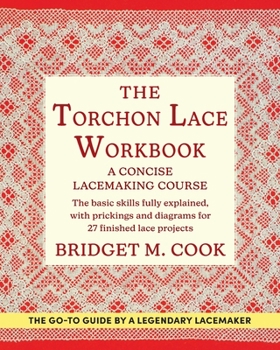The Torchon Lace Workbook
Select Format
Select Condition 
Book Overview
Craft Lace Masterpieces One Step at a Time
Here is the perfect book for the beginning lace maker. The Torchon Lace Workbook presents the basics, step by step, followed by patterns which employ these new skills. Bridget Cook expertly guides the reader through the basic techniques of Torchon lace, a style which is accessible and rewarding to all levels of ability.
Color photos of bobbins, pillows, and finished lace enhance the clearly written instructions, along with easy-to-understand color-coded diagrams. Exercises include employing the half stitch, whole stitch, diamonds, spiders, rosegrounds, Scandinavian holes, gimps, tallies, leaves, plaits, and picots. Projects go from nursery lace to collars, from frills to handkerchiefs. Ten comprehensive lessons on technique will prepare you for 27 original projects which use them. The projects graduate from basic to more complex, but whether a novice or a seasoned craftsperson, this well-presented compendium belongs in your collection.
Internationally known author and designer Bridget M. Cook has taught legions of aspiring lace makers for decades. She has presented lectures and demonstrations throughout Europe and the United Kingdom.
Be sure to complete your library of lace patterns and methods with Bridget Cook's other lacemaking titles published by Echo Point Books & Media: Russian Lace Making (ISBN 1648370284 hardcover, 1648370292 paperback) and Russian Lace Patterns (ISBN 1648370268 hardcover, 1648370276 paperback).
This book is also available from Echo Point Books in hardcover (ISBN 1648370241).
Related Subjects
Classics Contemporary Fiction Literature & Fiction Short Stories Short Stories & Anthologies



















